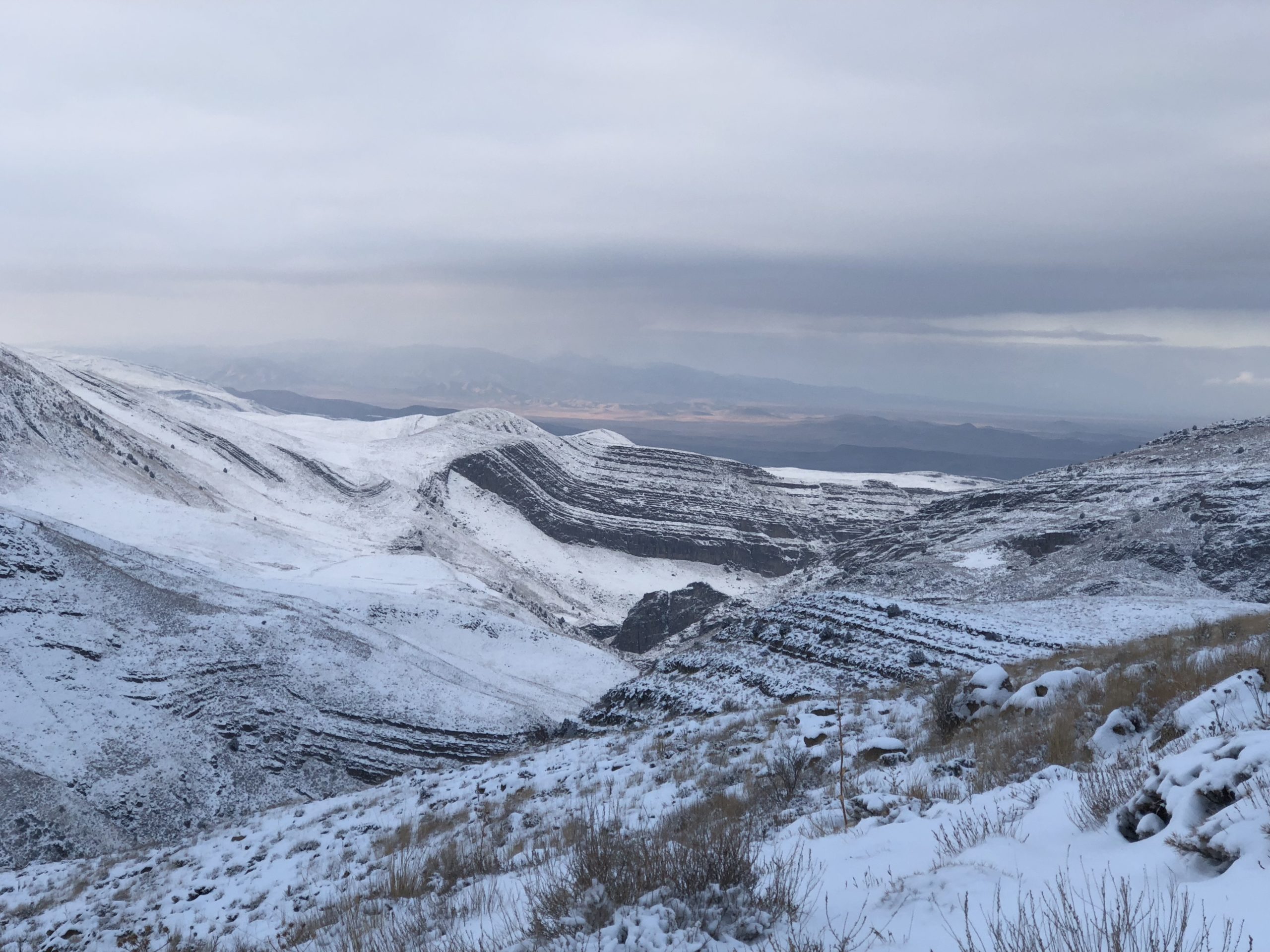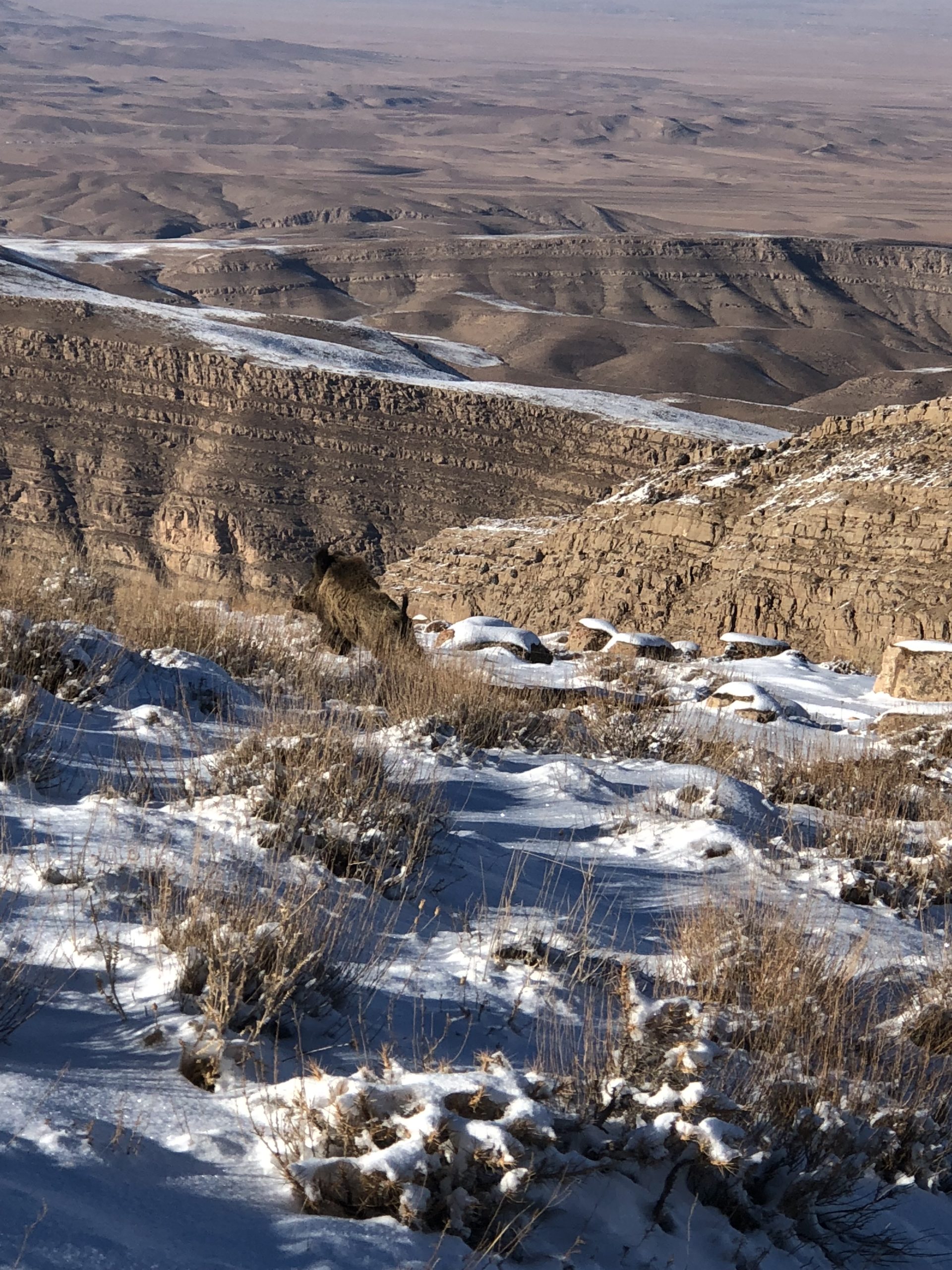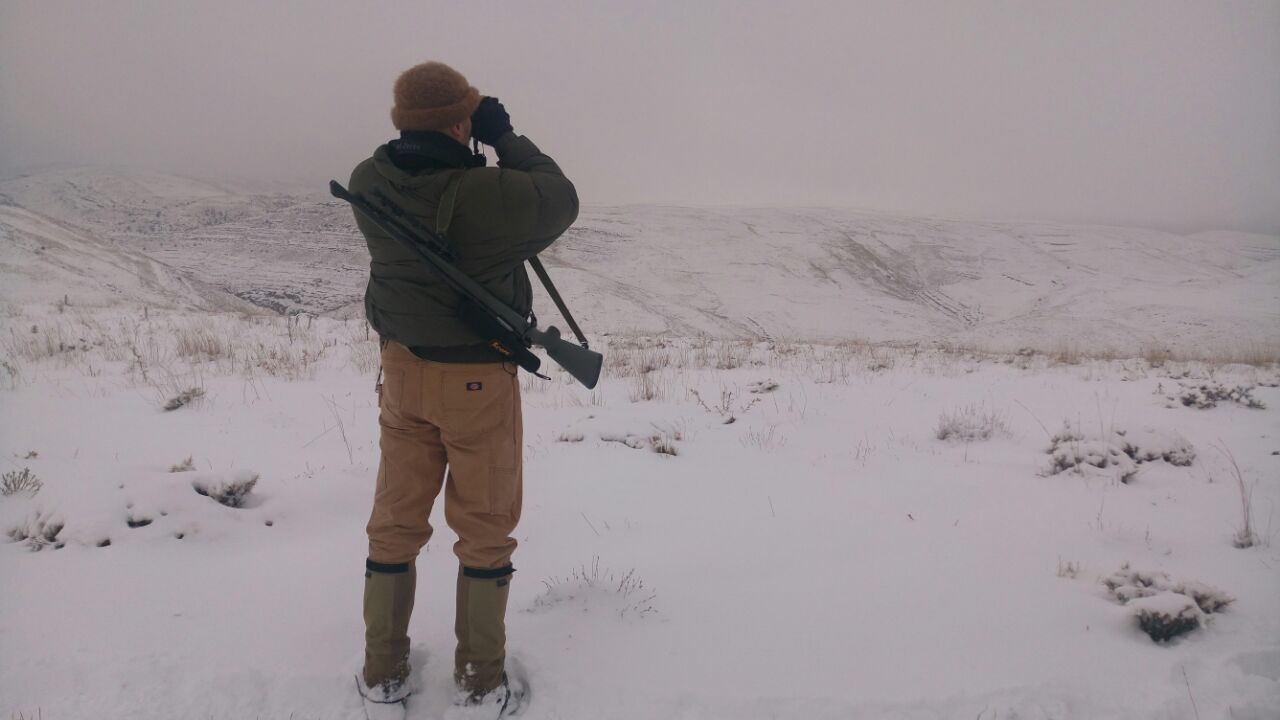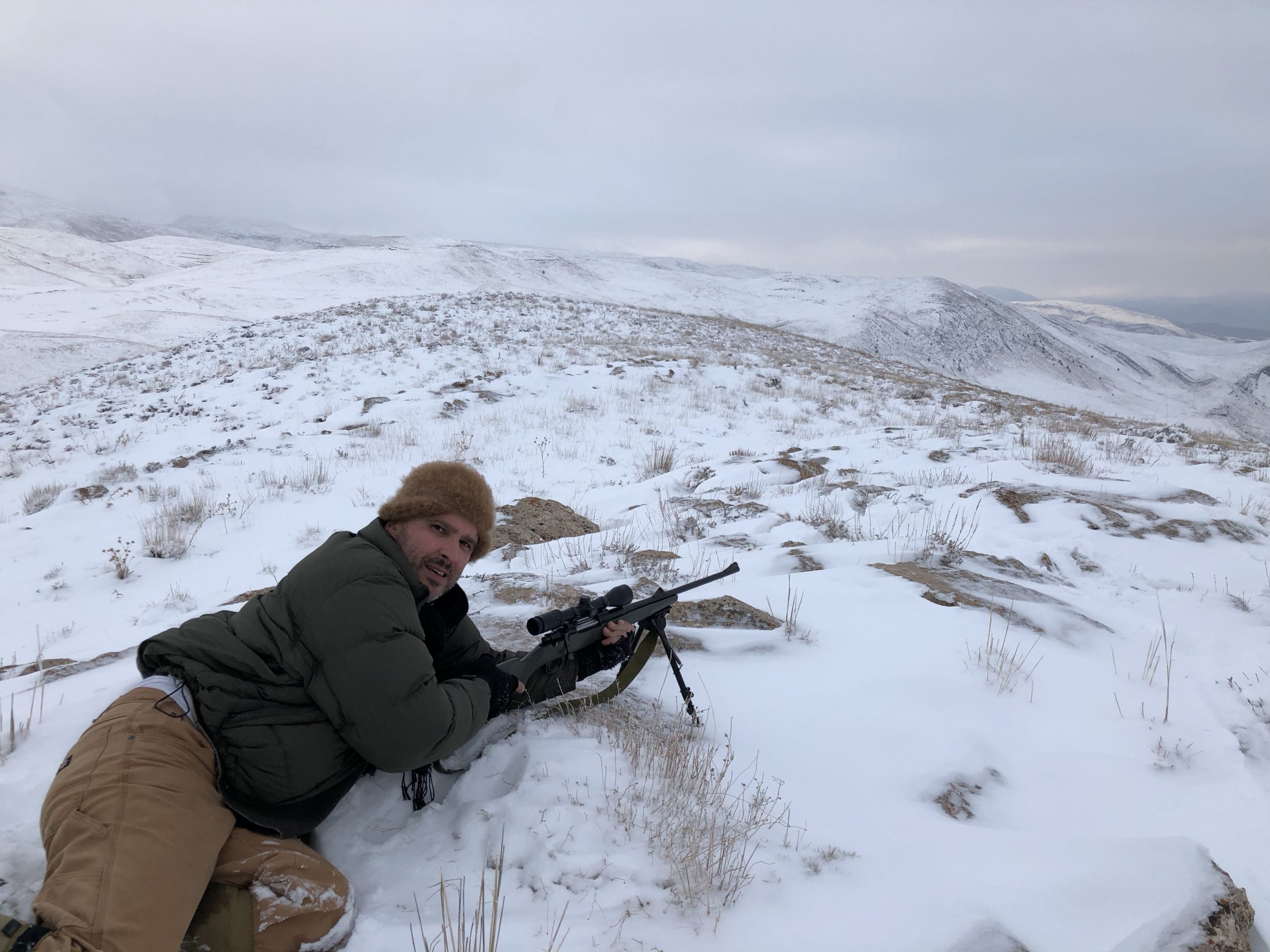Five years later, as soon as the ban was lifted, it was time for a second shot! This time around, Mr. Mostofi had secured a permit for another mountain range much further to the Northeast within three hours drive from the city of Mashhad. This area is world-famous amongst sheep hunters for producing some of the largest horns in the past 25 years. Many international hunters, including the late Dennis Campbell of the Grand Slam Club, had taken their trophies in this same area. Ideal habitat plus strict enforcement and good management had made it possible for wildlife to flourish in the area with minimal poaching: but there was a catch. This permit allowed us to hunt only in the mountains bordering the area and not inside it. This was due to the high demand for a handful of sheep tags available. But even though we would not hunt within the area, we still had a good chance to connect with a large ram in the bordering mountains. Sheep wandered in and out of the area freely since there were no fences. As a side note, this particular mountain range was also known to house the unique white Boar. Not albino, these boars are found only in the Binalood mountain ranges of Northeastern Iran and are either blond or white. But even here, the white boars were rare.
After those five years, once again, I was headed to Iran. The long 18-hour flight with a Frankfurt connection was smooth, and Mr. Mostofi met me at the airport in Tehran. After spending a few days in Tehran, I was to fly to Mashhad in the Northeast. As luck would have it, as soon as I arrived in Tehran, there was civil unrest and demonstrations against the government in the streets nationwide. Not thinking much of these events or how they could affect my hunt, I flew to my destination as planned. I was to stay in Mashhad for a day to obtain my permit and the signature needed from the head conservation manager and then head out with our team. As it turned out, Mashhad had the largest demonstrations of all. This is a very religious city, and every year millions of people visit its shrine from around the world. The shrine is an enormous source of income for the city as well as the country. The large demonstrations in the city had taken the officials by surprise. To counter these riots, the government issued an order instructing all its employees to attend rallies lasting all day supporting the government.

A dust of snow had covered the Urial country I was going to hunt.
Consequently, the game department employees didn’t show up at work for three days, leaving us without the signature needed on the sheep permit. I had allocated five days for this hunt and had to be back in Tehran to catch my flight back home to Idaho in three days. Wasting three whole days in Mashhad was not in my program, but we made lemonade out of lemons by visiting the resting place of Ferdowsi, the great Persian poet who wrote the epic “Book of Kings” a thousand years ago.
Finally, after what felt like an eternity, we obtained the necessary permit and signature and were ready to head out to our hunt destination. I had now two full days remaining for my hunt. Could I get a trophy ram in this short time? Mr. Mostofi once again assured me that all is now well again, and we are on our way to big ram country where I would have a good chance at one.
Our team for this expedition consisted of some new and interesting characters: Teymour, a local hunter and ex-poacher of average height, with a thick head of hair and a large mustache; he looked to be in his early 50s. To date, he had killed over two hundred Urial sheep, mostly for meat. He was an expert at hunting Urial sheep and an incredibly fast hiker in the worst possible rocky and steep terrain. After a few run-ins with the game wardens, he had sworn off poaching and had sold his rifle but still loved hunting and frequently helped his friends during hunting trips. He was chosen for this hunt due to his familiarity with the area and ability to find big rams. Our next crew member was Ali, not to be confused with Ali, our driver on the previous trip. This Ali was dark-skinned, tall, and thin. He owned a small orchard and was a part-time farmer in one of the small villages in the Binalud mountain range where our hunting was located. He was a true mountain man and loved hunting sheep. His ability to climb at high speed for hours carrying a whole wild sheep on his back had earned him the opportunity to accompany us on this trip.
He was also our cook, skinner, and rifle carrier. Both Teymour and Ali were humble men despite their outdoor expertise and physical ability. The internet is full of videos and articles, written by and starring guys who have hunted a handful of and pretend to be experts on sheep hunting. The true sheep hunting experts are men like Teymour and Ali, who have hunted sheep from the time they could barely walk. They use the same weapon for their entire hunting career and can find game in places no game should exist. They have personally hunted and killed hundreds of rams in their life and are a goldmine of information on the subject. But these men are usually illiterate and would not be considered sportsmen by western standards. Most importantly, they are not interested in giving advice. Experience shows you can learn only from the best of mountain men.

A giant wild boar that I could have hunted but passed up not to spook any sheep in the adjacent drainages.
We left Mashhad at 4 am and headed towards the mountains to the west of the city. The Binalud range is spread east to west, paralleling another mountain range called Hazar Masjed. Between the two mountain ranges lays a valley approximately 50 miles wide. Small towns and villages dot the valley. Some of these towns have been there for thousands of years before Genghis khan and Tamerlane’s invasions. Numerous earthquakes have also destroyed entire towns here over the millennia. But Iranians are survivors and overcomers. Without those qualities, this nation would not exist today. On our way, we stopped at a village in the foothills to pick up Mr. Pahlavan, the village headmaster, as the fifth member of our team. The headmaster was a strong and burly man in his 40s. He was from a local Kurdish subtribe, a shepherd by profession with a big laugh. His lips were shaped such that it made him look like he always had a smile on his face. His ancestors had been forced by order of the king to move from Kurdistan in the west of Iran to the Province of Khorasan, far to the east 400 years ago, where they were then given land and pasture and where they have lived (on) ever since. The headmaster owned a mud hut as well as grazing rights high up in the mountains at 7,000 feet, which he used as his summer headquarters. The hut was located near our hunting ground.
As he told the story, in his youth, he had served eight years in jail for murder. Water, being a very valuable commodity here, has been the cause of endless wars between villages and tribes. On one such occasion, Mr. Pahlavan’s village had gone to war with another village, and in the heat of the battle, one person was killed. The law enforcement officers had arrested the whole village, and most of the men were sentenced to jail time, even though the real culprit was never found. Despite his hospitality and jovial demeanor, I was a bit uneasy around him.
We were to spend the night at his hut and hunt the mountains surrounding it. As our borrowed 4-wheel drive made its way in the dark toward the highlands, I began to see snow on the ground. Two hours later, we were at the hut in a place named Cheshmeh. A foot of snow had covered the ground surrounding the hut, and low clouds were hovering over, making it hard to glass for sheep. The hut was a 20’x20′ room with a mud fireplace and one window that was covered with plastic to keep the wind out.
There was a heater in the center fueled by gasoline and an opening in the ceiling for ventilation. I wondered how our little mud structure would hold up should an earthquake, which are common in this region, shake the ground in the middle of the night. Although it was mid-morning, we sat on the carpeted floor, and our host, the headmaster, unrolled our sleeping mattresses. We planned to unload the SUV and begin glassing for game, but shortly after our arrival, heavy snow began falling hard, and low clouds continued to cover the mountains. There was nothing to do but be patient. We sat around the fireplace drinking tea and listening to the headmaster and his stories about the wolves, leopards, and boars that roam the area in relatively high numbers. When your family has lived in the same mountains for 400 years, campfire stories are endless.

Tea, bread, cheese and fire; simple joys of camp life when you hunt for Urials.
The snow continued to come down hard. Snowflakes coming in through the opening in the ceiling were large but melted as soon as they hit the warm air inside. I had now lost more than half of my day, but I tried not to be anxious and focus on our conversation, all the while keeping an eye on the opening in the ceiling, hoping the snow would stop. Toward late afternoon the snow finally stopped, and the sky partially cleared. A patch of bright blue could be seen through the vent opening. We quickly got in the vehicle and drove a short distance to the summit from which we could see deep canyons stretching out in all directions for miles. The guides and I began hiking down to investigate the smaller side canyons and benches where an old ram might hang out after the snow. We had only a few hours before it would be dark. The only thing we saw was a band of Urials consisting of ewes and small rams and several herds of wild boars, with some enormous boars in the bunch. The boars were frantically plowing the snow-covered earth for food and didn’t seem to mind us too much. It was bitterly cold and windy after the sky had cleared. Almost dark now, we headed back to the hut.
That night, finding a big Urial ram such as the one I had seen on the cover of the hunting magazine decades ago seemed impossible. Mr. Mostofi, drinking his tea, stated that in the morning, we would find the granddaddy of all sheep. I was willing and determined, but we needed Lady Luck to cooperate. After a light dinner, we all went to bed, snoring like five bears in their (winter) den until 5 am. It was still an hour or two before sunrise when I went outside to check the sky. It was clear and bitterly cold with no wind. “Perfect!”
Finally, a break in my luck. Everyone was up soon, and Ali had made a delicious breakfast. As we got in the SUV, Teymour turned the key, but there was only a metallic Chak, Chak, Chak from under the hood. The engine seemed to have frozen. He tried over and over, but the old SUV would not start. Since it was a manual, we tried pushing the SUV in a foot of snow by clearing a path downhill, but that didn’t work either. The headmaster suggested building a fire under the engine to warm it. I stayed back since I had never seen or heard such a thing and was afraid the SUV would blow up as the flames hit its underside. This went on for over an hour. The sun was now beginning to show itself in the east; it was my last day, last chance, and things were not going well. Mr. Mostofi decided that he and the headmaster would stay by the hut with the SUV and would try radioing someone in Mashhad 3 hours away to get help. This time of the year, no one even drives close to these mountains, let alone drive up to 7000 feet. We had no hope of seeing another vehicle to get help. The plan for me was to take the two guides, Ali, and Teymour, and hike down the mountain to the nearest village 14 hours hiking distance (and that’s if we didn’t stop anywhere). We had no other choice.

I had somewhat of a broken spirit after all the trouble we had endured, robbing our limited days to hunt.
To make matters worse, I had a flight to catch that evening at 11 pm for Tehran and was to fly home to Idaho the next day. On our way, if we were lucky, we could get a ram, but at this point, I was not counting on it. We wished Mostofi and Pahlavan luck and headed down the mountain, hoping they would be able to get help. Deep snow made for slow going, and any exposed rock was covered with ice. I have always considered myself an above-average hiker, especially when descending, but my two companions wearing only rubber galoshes were truly amazing maneuvering in snow, rock, and ice. I was able to keep up with them physically, but after a few hours of nonstop climbing down, my brain began to tire of calculating the rough and steep terrain at high speeds. At one point, the two men quickly walked across a cliff ahead of me. Following them closely, just before crossing, I realized there was no visible way or ledges that indicated where one could actually cross it. It seemed impossible to the eye, but I had to keep up, so I walked on that very steep and icy cliff, not knowing how I could stay on it without falling into the canyon below. But I had just witnessed the two men do it; with galoshes! After somehow getting across, Ali turned back and walked towards me and took a look at my German-made boots and shook his head: “you need to get rubber boots like these,” pointing to his cheap rubber galoshes.
It was now close to noon, but there was no time to rest. We continued at breakneck speeds down towards the valley floor still hours away. Eventually, we reached a saddle, and in front of us, less than 10 feet away, stood a very large boar plowing through the snow with his back to us. He was unaware of us until, finally sensing our scent, he became alert. We all froze in our track, waiting for him to make a move. Wild boars will charge if surprised, so I was ready. Ali wanted me to shoot, but we had no way of getting him off the mountain. Fortunately, he raced away and disappeared down the hill. Shortly after this, we spotted five rams, one of them being a good one with full curls 600 yards away. They were on our side of the valley but further down. There was no doubt this was my last chance, so we began hiking above them. After an hour, we reached where we thought they should be but soon heard rocks rolling below us and saw the spooked rams running as fast as they could on the other side of the valley headed for the ridge above them. The distance was at least 400 yards: I dropped to my knees and tried to find the biggest ram in my scope. The rams continued running with the largest one in the rear. I squeezed the trigger of the 7mm as the ram had reached 450 to 470 yards, aiming 30 inches above and 20 inches ahead and missed him clean—a shot of desperation. I didn’t attempt another shot but admired the ram until the band disappeared over the ridge 800 yards away.

Thank God for a clean miss on an impossible ram!
The sun was low, and we had lost time. We still had hours of hiking ahead, but at least I had been able to see and take a shot, albeit an almost impossible one, at a ram. From this point on, we increased our speed and continued our descent to the bottom through rocks, ice, snow, and mud. At last, we reached the bottom of the canyon just minutes before dark — nine hours after we had left the hut and our broken-down SUV. I was just about to ask to stop for a break when I saw Ali and Teymour pulling at dried grass and gathering sticks to make a fire. The canyon floor was clear of snow and slightly less windy and cold, but my sweat-soaked clothes and low blood sugar was causing uncontrollable tremors in my body. A large fire was now going, and we began preparing tea and sharing the few provisions we had in our backpacks. We had not eaten anything since we left camp, and now I was suddenly extremely hungry. Ali handed me a cup of hot tea half-filled filled with raw honey from his own hives. It was the best tea in the world at that moment, and the high glucose content in the honey stopped my tremors. In a few minutes, I was able to warm up by the fire. The urge to sleep right at that spot was strong, but we still had five more hours of walking before we could reach the nearest village and get help. It was pitch black as we put the fire out and headed down the dry river bed towards the mouth of the enormous canyon. From there on, we would be walking over rolling hills and eventually flat ground.
The dry river bed snaked its way through (the) canyon walls 400 feet above us. Initially, the rocks in the river bed were smaller, but the lower we got, the larger the rocks got, and we began to trip on them in total darkness. Luckily, I had brought my trusty headlamp used in many hikes back home in Idaho. My companions didn’t have any flashlights, so the three of us walked close to each other so we could all see the river bed and avoid falling in the dark. To distract us from the long way still ahead, I asked Ali if he could sing us a song. He reluctantly began singing a traditional Persian song. As his voice began echoing off the cliffs, he was encouraged to sing louder and with more confidence. As we walked in the dark and listening to Ali singing, we suddenly saw a flash of light hit the cliffs ahead of us. We listened. Far away, there was the whining of an engine. This was either a game warden on patrol or someone coming for help. A few minutes later, we could see the bright beams of two vehicles coming around a bend. We were standing in the middle of the river bed and could see the SUVs bouncing up and down as they came toward us, finally stopping. The doors flew open, and there were Mr. Mostofi and the headmaster.
We were happy to see them, but even happier we didn’t have to walk another five hours. They explained that a few hours after our departure, they were able to find a mechanic in Mashhad with a large SUV equipped for the snow to come to their rescue. There is no such thing as AAA in Iran, and it turned out a malfunctioning spark plug was the problem. Quickly replaced, it had started the old SUV. I quickly said goodbye to my guides and companions and thanked them before driving out with the mechanic and Mr. Mostofi an hour later, and we were back on pavement driving at high speeds to catch my flight to Tehran. I barely made the flight, got to Tehran at 1 am, and passed out on my bed at a friend’s place. The next day I caught my flight back to Frankfurt in the afternoon and was home in Boise Sunday night, exhausted but happy to see my family again. Back at work the next day, I thought to myself about the political unrest, bad luck, cold weather, BUT, I couldn’t forget that big ram. My second attempt to get a large ram had failed, but the adventure I had just experienced was more than worth the trip.
The following season I again received an excited call from Mr. Mostofi. There was a chance he could secure a permit for one of the best areas in Iran for Urial sheep. The permit would be for an area that is protected with very limited hunting permits and, by the last count, home to 2,600 Transcaspian Urial. Even though this was great news, I hesitated. I told Mr. Mostofi I would call him back in a few days. I had experienced great adventures on the past two trips, but when it came to finding a big ram and getting a proper shot at it, I just had no luck. Add to that the short three day hunts at best and unfamiliar weapons with questionable handloaded ammunition, and all made for a very far-reaching and impossible goal. Talking it over with my wife, she was 100 percent supportive of me going back and not giving up. With last year’s riots and demonstrations now gone, things could still change in Iran very quickly. My head guide, Mr. Mostofi, could simply retire from organizing hunts, and many other events not in our control could prevent me from ever reaching my goal. “What if this was your last chance ever?” she said. I agreed with her but still couldn’t convince myself to commit to yet another long journey. The only way I could get another chance at an old Urial ram was to give it another try.

